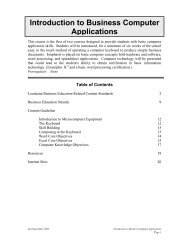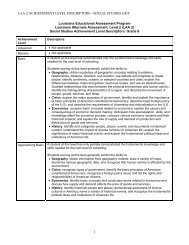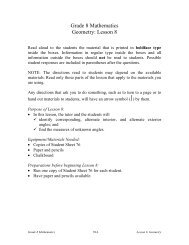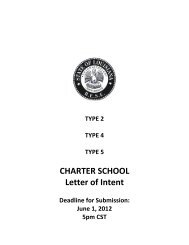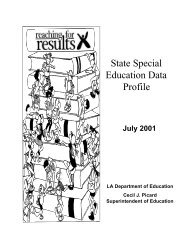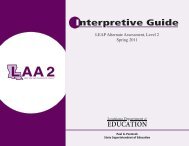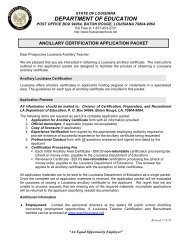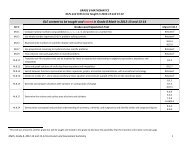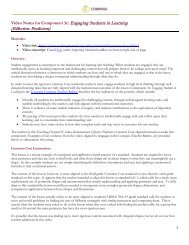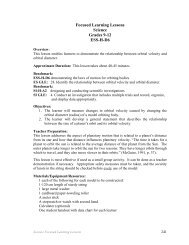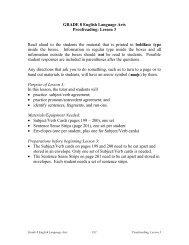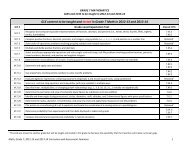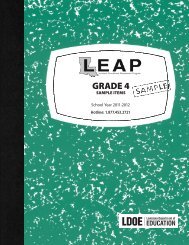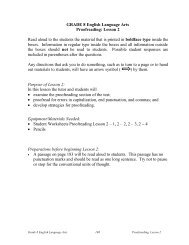School Improvement - Louisiana Department of Education
School Improvement - Louisiana Department of Education
School Improvement - Louisiana Department of Education
You also want an ePaper? Increase the reach of your titles
YUMPU automatically turns print PDFs into web optimized ePapers that Google loves.
Standard<br />
Level 4<br />
No Application<br />
<strong>of</strong> Standard<br />
In this school/district:<br />
Level 3<br />
Minor Application<br />
<strong>of</strong> Standard<br />
In this school/district:<br />
Level 2<br />
Substantial (Not Total)<br />
Application <strong>of</strong> Standard<br />
In this school/district:<br />
Level 1<br />
Total Application<br />
<strong>of</strong> Standard<br />
In this school/district:<br />
EVIDENCE<br />
Documentation<br />
For Recommended<br />
Level<br />
Learning<br />
Staff development that<br />
improves the learning <strong>of</strong><br />
all students applies<br />
knowledge about human<br />
learning and change.<br />
a. Staff development<br />
methods assist<br />
educators with only<br />
surface features <strong>of</strong> a<br />
new idea. No<br />
attention is paid to<br />
active learning<br />
processes that<br />
promote reflection<br />
and problem solving.<br />
b. Educators are given<br />
no opportunity to<br />
practice new skills<br />
and receive feedback.<br />
c. No attempt is made<br />
to identify and<br />
address educators’<br />
individual concerns in<br />
order to plan<br />
appropriate follow‐up<br />
support.<br />
a. Several staff<br />
development<br />
methods are used to<br />
help educators<br />
develop an in‐depth<br />
understanding <strong>of</strong><br />
innovations. Some<br />
active learning<br />
opportunities are<br />
provided.<br />
b. Follow‐up activities<br />
are used sporadically<br />
to provide educators<br />
an opportunity to<br />
practice new skills.<br />
Feedback is available<br />
but insufficient.<br />
c. Information on<br />
educator concerns is<br />
occasionally<br />
collected, but few if<br />
any follow‐up<br />
interventions result.<br />
a. Educators benefit<br />
from a number <strong>of</strong><br />
staff development<br />
methods that mirror<br />
the methods that<br />
teachers are<br />
expected to use with<br />
students. These<br />
include active<br />
learning that<br />
promotes reflection<br />
and problem solving.<br />
b. Many (but not all)<br />
educators have the<br />
opportunity to<br />
practice new skills<br />
and receive feedback<br />
on performance.<br />
c. Information on<br />
educator concerns is<br />
<strong>of</strong>ten collected and<br />
used to design<br />
interventions and<br />
follow‐up strategies.<br />
a. The staff<br />
development<br />
methods used to<br />
support educator<br />
learning consistently<br />
mirror the teaching<br />
methods that have<br />
proven effective in<br />
promoting student<br />
learning.<br />
b. Participants have<br />
regular opportunities<br />
to practice new skills<br />
and consistently<br />
receive feedback on<br />
their performance.<br />
c. Information on<br />
educator concerns is<br />
routinely gathered<br />
and used to tailor<br />
interventions and<br />
follow‐up strategies<br />
to the participant’s<br />
individual learning<br />
needs.<br />
158



